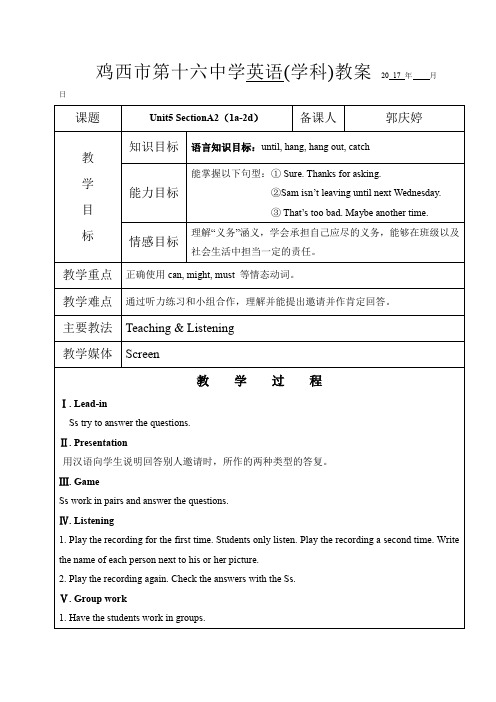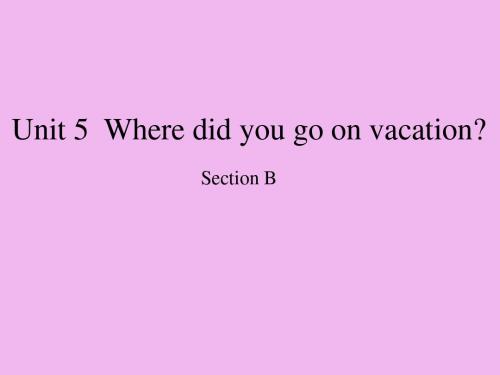鲁教版五四制七年级英语上册Unit5 Period 4教案
- 格式:doc
- 大小:121.50 KB
- 文档页数:3

Unit 5 Can you come to my party?Section A 1a-2dListening and speaking一.教学分析1.教学内容分析教学内容是鲁教五·四学制七年级下册Unit 5 “Can you come to my party?”Section A 1a-2d部分,课型为听说课。
本单元的核心话题是Invitations,功能目标是:Make, accept and decline invitations; Talk about obligations.语法结构是Can for invitations and Modal verb might.目标语是Can you come to my party on Saturday? Sure, I’d love to./Sorry, I must study for a test. Can he go to the party? No, he can’t. He has to help his parents. Can they go to the movies? No, they’re not free. They might have to meet their friends.在Section A部分,主要围绕“邀请”这个话题和交际功能展开。
这部分主要让学生学会发出邀请、接受邀请或拒绝邀请的句型,并能用学到的短语和句型进行对话,展开问答互动,完成有效的交际和语言输出。
学习的难点是礼貌拒绝邀请并能说明原因。
而Section B的内容则是在Section A的口头对话发出、接受或拒绝邀请的基础上,逐步过渡到以书面的形式,写出一封邀请函,有礼貌地以书面语恰当地发出邀请、接受邀请或拒绝邀请。
本节课是本单元Section A的第一节课,以听和说为主,导入主题Invitations。
主题图是Sun Ning邀请朋友参加派对,朋友接受或邀请派对的情景,并在1a呈现了prepare for an exam, go to the doctor, have the flu, help my parents和meet my friend等重点短语。


鸡西市第十六中学英语(学科)教案20 17 年月日课题Unit5 SectionA2(1a-2d)备课人郭庆婷教学目标知识目标语言知识目标:until, hang, hang out, catch能力目标能掌握以下句型:① Sure. Thanks for asking.②Sam isn’t leaving until next Wednesday.③That’s too bad. M aybe another time.情感目标理解“义务”涵义,学会承担自己应尽的义务,能够在班级以及社会生活中担当一定的责任。
教学重点正确使用can, might, must 等情态动词。
教学难点通过听力练习和小组合作,理解并能提出邀请并作肯定回答。
主要教法Teaching & Listening教学媒体Screen教学过程Ⅰ. Lead-inSs try to answer the questions.Ⅱ. Presentation用汉语向学生说明回答别人邀请时,所作的两种类型的答复。
Ⅲ. GameSs work in pairs and answer the questions.Ⅳ. Listening1. Play the recording for the first time. Students only listen. Play the recording a second time. Write the name of each person next to his or her picture.2. Play the recording again. Check the answers with the Ss.Ⅴ. Group work1. Have the students work in groups.2. Let some groups ask and answer about their conversations.Ⅵ. ListeningWork on 2b:1. Let Ss read the chart below. Tell Ss, this time they must write the reasons in the chart. Make sure they know what to do.2. Play the recording for the Ss to write the reasons in the chart.3. Play the recording again to check the answers.Ⅶ. Pair work1. Ss practice the conversations using the reasons in the chart on the right.2. Ask some pairs to act out their conversations.Ⅷ. Role-play1. Read the conversations and answer the questions:1) What did they do last fall? _____________________________________2) What does Nick have to do on Saturday? _____________________________3) When will they hang out? _____________________________2. Explain some new words and main points in the conversation.until, not…until, hang out, catchHomework:假设你将于这个周末过生日,并开一个生日聚会,你约请朋友们参加你的聚会,但有几名同学因故不能来,请你将与他们的对话用英语编写出来。



unit5 What’s the matter?单词:事情;问题;差错得(病);患(病)伤风;感冒患感冒胃痛;腹痛;肚子痛疼痛的后背;背脊臂;胳膊耳朵眼睛脚;足手头部腿部嘴;口腔脖子;颈部鼻子胃部牙齿喉咙;咽喉牙痛发烧休息蜂蜜牙医应该头痛(距...)以前如此;这样疾病;生病劝告;忠告;建议渴的;口渴的加压力于;使紧张紧张的;有压力的脆的;易碎的谷类植物;加工制成的谷类食物甜饼干;曲奇饼早;提早问题;令人困惑的事物方法;手段传统的相信;认为平衡;协调虚弱的;无力的党参黄芪草本植物愤怒的;生气的豆腐药;药物西方的;来自西方的每人;人人变得(表示否定)很少;几乎没有(表示肯定)有些;几个继续是;保持重要的;重大的平衡的;协调的饮食;节食瞬间;片刻晚直到...之时(表示惊奇、苦恼、懊悔等)呵;哎呀寄宿家庭昨天;昨日听见;听说词组:1、感冒have a cold2、发烧have a fever3胃痛肚子痛have a stomachache4牙疼have a toothache5、嗓子have a sore throat6背疼have a sore back7胳膊疼have a sore arm8腿疼.have a sore leg9、躺下/坐下4ie down /sit down10、休息一会have a rest11、加蜂蜜的热茶hot tea with honey12、看牙医see a dentist13、多喝水drink lots of water14、很紧张、有压力be stressed out15、感到疲劳、饥饿、口渴feel tired /hungry/thirsty16、太多的。
too many+可数名词too much+不可数名词17、连续几个晚上a few nights18、听音乐listen to music19、早点睡觉go to bed early20、中药Chinese medicine21、保持健康keep/stay healthy22、此时、此刻at the moment23、学习到很晚.study late24、需要做某事need to do sth.25大约两天前about two days ago26西方国家western countries27几个苹果a few apples28。
Units 5 同步话题阅读TV programsThere are different kinds of TV programs for you. When you watch the TV programs, your brain cells keep active. So it is helpful for you.Now more and more people are very busy. They need a way to make themselves relaxed. Watching Tv is an easy way to make it. You can find your interest on TV and think less about your trouble.There are many educational programs on TV. You can get a lot of knowledge by watching TV. For example, you can learn about the history of other countries. When you watch TV with your family, you can share your ideas with them. You will have a great time by watching a funny program. When you watch TV, you can learn English, and you can also learn about the latest news.①brain cell 脑细胞②knowledge/ˈnɒlɪdʒ /n.知识电视节目有不同种类的电视节目适合你。
当你看电视节目时,你的脑细胞保持活跃。
所以看电视对你有益处。
现在越来越多的人都很忙。
鲁教版(五四制)英语七年级上册单元练习Unit 5 Where did you go on vacation(含答案)鲁教版(五四制)英语七年级上册单元练习Unit 5(含答案)一、单项选择1.—Would you like ________ fish, Mike—No, thanks.A.some B.any C.a D.an2.There is ________ with my computer.A.wrong something B.something wrongC.wrong anything D.anything wrong3.—Can I use your e-bike—Sorry. I don’t have ________.A.that B.it C.this D.one4.______is bad for your health.A.Staying up late B.Stay up late C.Stays up late5.There is _________ in today’s newspaper. I think you will be interested in it.A.anything interesting B.interesting anythingC.something interesting D.interesting something二、完形填空I often spend my summer holidays just with my parents. It is quite boring. But last summer holiday was 6 . Some of my friends came to stay with my parents and me for a week at our summer house. It is in a small beach town called Portsea. They got there by train. It 7 them three hours.One morning my friends and I 8 to take my parents' boat for a ride. We rowed (划船) 9 half an hour and found a big cave (山洞). Susan said it could be dangerous to go into it. But Peter said it was okay. 10 we started rowing again and got in. Then the tide (潮) started. At first we thought we could fight it but we were 11 . We shouted for 12 but there was no one around. Susan and I began to cry. Louis told us not to worry because the tide would be out. Because Louis always seemed to know the answer to 13 ,we stopped crying.Luckily, Louis was right 14 . After some hours the tide went out. We rowed back home quickly. We didn't 15 my parents about this special trip. And we were so afraid that we would not have a boat ride again.6.A.terrible B.difficult C.popular D.different7.A.took B.spent C.gave D.used8.A.waited B.dreamed C.decided D.thanked9.A.in B.on C.to D.for10.A.Because B.So C.If D.Or11.A.late B.wrong C.sorry D.busy12.A.help B.luck C.fun D.time13.A.someone B.anyone C.nothing D.everything14.A.yet B.still C.again D.too15.A.call B.show C.ask D.tell三、阅读单选You can see people in films have a white Christmas in England or in the USA.But Christmas in Australia is very different. It is very hot. Christmas (Dec. 25) comes at the hottest time of the year in Australia. The temperature can be over 40℃ in some cities! Because it is so hot, people usually have lunch outside and swim in the pool during Christmas. They also meet all their family members for Christmas lunch. Christmas lunch is usually a big meal of ham (火腿), turkey, salad and seafood. Family members all cook something different to bring to the big meal. One year my aunt even made а gingerbread house (姜饼屋) that we ate for dessert (甜点)!The sport of cricket (板球) is very popular in Australia. So during Christmas, family members also play a game of cricket in the backyard. Australia may not have а white Christmas, but it is still a very exciting and fun time of the year.16.When Christmas comes, it is very ________ in Australia.A.cold B.warm C.hot D.cool17.How do Australian families usually have their Christmas big meal A.They go to a nice restaurant and have a great meal there.B.They cook different things and bring them together.C.They just have a picnic.D.They buy some Christmas food on the Internet.18.What is very popular in Australia during ChristmasA.Cricket. B.Basketball. C.Volleyball. D.Football.19.Which of the following will you NOT see at Christmas in Australia A.Outdoor lunch. B.Swimming.C.Playing cricket. D.Playing with snow.20.What is the best title (标题) of this passageA.Sports in Australia B.Food in AustraliaC.Christmas in Australia D.Families in AustraliaI spent my last vacation trekking in Nepal(尼泊尔), a small country in the Himalaya Mountains of Asia. On a trekking vacation, you walk for long distances(距离) through the mountains. There are very few roads in Nepal, so trekking is the best way to travel. It's best if you hire(雇佣) a guide. The guides know the best paths to take and they also help trekkers with their bags. Our guide even cooked our food for us. Every day, we trekked for about four hours before lunch, and about two hoursin the afternoon. At the end of the day's trek, we sat around a campfire and talked about the things we saw. Then we went to sleep in large tents. Every morning, our guide brought breakfast to our tent. It was great. At the end of the trip, I didn't want to go home!21.How long did the writer walk everydayA.Two hours. B.Four hours.C.Six hours. D.Seven hours.22.Which statement is NOT trueA.We slept in large tents.B.The guide cooked food.C.There are many roads in Nepal.D.You can eat breakfast in your tent.23.The word “trekkers” in the passage means “________”.A.people who cook your foodB.people who travel by walkingC.people who carry bags for youD.people who live in Nepal24.What did the writer think of the tripA.Boring. B.Funny.C.Relaxing. D.Terrible.25.What is the best title for this readingA.Traveling through AsiaB.The People of NepalC.Exercise and HealthD.Walking in the Mountains四、阅读判断Linda was born in Paris on December 24, 1988. It was her fifteenth birthday yesterday. She invited(邀请)her friends to her party a few days ago. Her parents were busy yesterday.But they got ready for(准备好)the party. They bought some fish, chicken, beef, vegetables, drinks and fruit. Everything was ready. They put all the food and drink on the table. And there was a nice birthday cake on the table, too.It was seven fifteen and the party began. The girl stood near the window and looked out. She saw her friends coming. She ran to meet them at the door. Her parents could hear the children say “Happy birthday to you!” outside.根据短文内容判断正(T)误(F)。
《Unit 5 Where did you go on vacation Section B(2a-2e)Period
4》
教
学
目
标
1.通过学习2b能够理解和掌握重点单词
building,trader,umbrella,wet,because of,dislike,enough,decide,activity,
try,wonder等。
2.能够正确写出一些动词的一般过去时形式。
能够围绕旅游话题进行多个方面的描述和讨论
3通过描述过去的事情,使学生学会尊重和理解别人,学会了解他人的喜好,增进情谊。
交流旅行见闻,增加阅历。
教学
重 点
1. 正确运用一般过去时描述和谈论旅游相关方面。
2. 正确运用一般过去时态和旅游相关形容词,以书面形式记录自己过去的旅游经历。
教学难 点 熟练掌握谈论过去事件的方法,用过去式描写自己的一段旅游趣事
学情分 析 一般过去式是学生的学习难点之一,教师应创设真实情境、组织有意义的任务或活动来
展开一般过去式的教学,避免过分强调语法。
教学准 备 Recorder. Multi—medium computer
集体备课 个人备课
Step One: Show the preview works (text-books and note-paper). Teacher : 1. Draw a check table on the blackboard. 2. Listen to the report from the winners. Try to find out how the students preview, and sum up . 3. Show the aims for students to choose. (At the same time, students step into the second step slowly, some by some.) Step Two: Learn by themselves. Students: 1. Decide my own aims. 2. Self-study: 1)熟读课文2b,看谁朗读地流利又准确。 2)认真阅读短文并完成课本P38 “2c and 2d” 3)阅读2e,根据2c,2d,进行小组讨论,将2e中的动词以正确形式填空 4)根据2e,将Jane的日记以六句话的形式呈现出来。 Step Three: Talk about the problems with the teacher together. I feel like I was a bird. feel like+从句 意为“觉得好像是„„” I feel like I’m walking through the history. 我感觉好像是倘佯在历史的长河中。 [拓展]feel like的其他用法:
① feel like + 名词或代词意为“觉得好像”
It feels like rain soon.
感觉天好像很快就要下雨了。
② feel like + 动名词 意为“想做„„”
I don’t feel like walking today.
今天我不太想去散步。
辨析] below与under的区别:
below指某物处于较低的地方,但不一定
是正下方; under指处于某物的正下方。
我们在月下We are below the moon.
那名男孩子站在树下。The boy stood under the tree.
Step Four: Practice: 运用一般过去时态写一篇日记,描述你一天
都干了什么。
Step Five: Summary and Test
Step Six: Show students how to preview for next class. (3a-4)
小
结
:
学
科
知
识
构
建
与
板
书
设
计
Unit 5 Where did you go on vacation?
Choose your aims :
1)熟读课文2b,看谁朗读地流利又准确。
2)认真阅读短文并完成课本P38 “2c and 2d”
3)完成2e 并复述这篇日记
4)运用一般过去时态写一篇日记,描述你一天都干了什么。
反
思
与
重
建
附:
课前检测题:
附:一.课前检测题:个性预习作业同层对比
二.课堂检测题:运用一般过去时态写一篇日记,描述你一天都干了什么。
三、作业设置:
1.Review and master the new words and drills learnt in this class.
2.Preview the contents on page 39.
3.Workbook Exx in workbook.(选做)